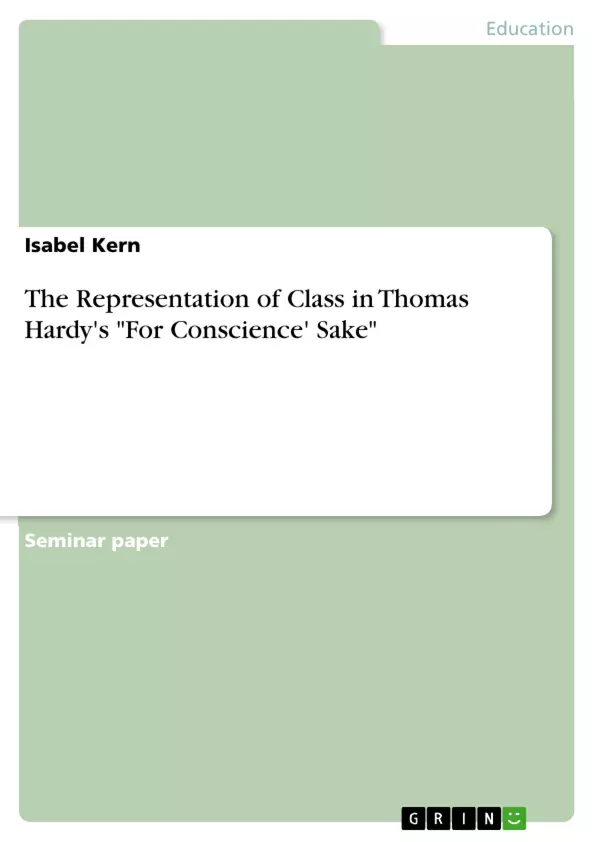The high class-consciousness of Victorian England is very prominent in Hardy's short story, so that the aim of this paper is to show that "For Conscience' Sake" breaks with the conventions of the Victorian literary marketplace in order to depict the consequences of a relationship or marriage between people from different classes induced by a very class-conscious society, and that these consequences not only affect the female part of the couple.
In order to prove this thesis statement, I will firstly show the class differences between the different characters, analyse difficulties that emerge with the relationship between the characters induced by their class difference, and finally conclude with the statements that the text offers about class and culture of the late 19th century.
For the utilitarians of the 19th century "only will power and a degree of talent were needed to achieve economic and social success", so that people became increasingly class-conscious and attempted to rise in terms of their social class. The rise of the working and middle classes led to growing fear of the upper classes and with the right to vote for educated middle-class members, the upper classes had to rule the country together with them.
Table of Contents
- Introduction
- Theory and Method
- Literary Approach and Analytical Categories
- Definitions
- Class
- Lower-, Middle-, and Upper Classes
- Analysis and Interpretation
- Remorse and its Consequences
- The Clash of Classes
- Conclusion
Objectives and Key Themes
This paper aims to demonstrate how Thomas Hardy's short story "For Conscience' Sake" diverges from conventional Victorian literary practices in its portrayal of a class-based relationship and its consequences. The story challenges the social norms of the Victorian era by exploring the implications of an illegitimate child and the social barriers between different classes.
- The Representation of Class in Victorian Society
- The Impact of Class on Personal Relationships
- The Consequences of Illegitimate Childbirth in Victorian England
- Hardy's Critique of Social Conventions and Class Hierarchy
- The Role of Remorse and Reconciliation in the Story
Chapter Summaries
- Introduction: This chapter establishes the context for the analysis of "For Conscience' Sake" by highlighting the social and cultural influences of the 19th century, including the impact of the French Revolution and Industrial Revolution on class dynamics. It also introduces the central argument of the paper, focusing on how the story breaks with Victorian conventions and explores the consequences of interclass relationships.
- Theory and Method: This section outlines the theoretical framework and analytical approach employed in the paper. It introduces the contextual approach, which analyzes the story in relation to Victorian culture and society. It also explains the specific methods used to illustrate Hardy's construction of class, including plot summary, characterization, and textual analysis.
- Analysis and Interpretation: This chapter delves into the analysis of "For Conscience' Sake," focusing on the central themes of remorse, the clash of classes, and the consequences of the relationship between Mr. Millborne and Leonora. It examines the characters' social backgrounds and the challenges they face due to their class differences. It also explores how the story critiques social norms and the impact of societal pressures on individuals.
Keywords
This paper explores the representation of class in Thomas Hardy's "For Conscience' Sake," focusing on concepts such as Victorian society, class hierarchy, illegitimate childbirth, social conventions, interclass relationships, remorse, and the consequences of social and cultural pressures on individuals.
Frequently Asked Questions
How is class-consciousness represented in Thomas Hardy’s work?
Hardy portrays the high class-consciousness of Victorian England, showing how social barriers dictate the lives and relationships of his characters.
What are the consequences of interclass relationships in Hardy's stories?
Relationships between different classes often lead to social isolation, remorse, and severe consequences for both men and women involved.
How does "For Conscience' Sake" break Victorian literary conventions?
The story challenges norms by depicting the realistic fallout of illegitimate childbirth and the rigid hierarchy of the Victorian marketplace.
What role does remorse play in the story?
Remorse drives the plot as characters attempt to reconcile past actions with their current social standing, often with tragic results.
How did the 19th-century utilitarian view affect social mobility?
Utilitarians believed talent and willpower could achieve success, leading to increased class-consciousness and a fear of the rising middle class among the elite.
- Citation du texte
- Isabel Kern (Auteur), 2017, The Representation of Class in Thomas Hardy's "For Conscience' Sake", Munich, GRIN Verlag, https://www.grin.com/document/488979



